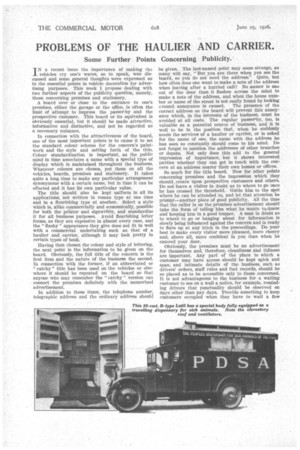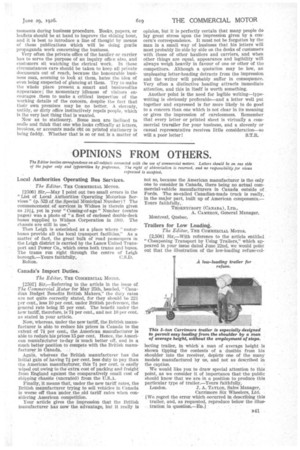PROBLEMS OF THE HAULIER AND CARRIER.
Page 24

Page 25

If you've noticed an error in this article please click here to report it so we can fix it.
Some Further Points Concerning Publicity.
TN a recent issue the importance of making the vehicles cry one's wares, so to speak, was discussed and some general thoughts were expressed as to the essential points in vehicle decoration for advertising purposes. This week I propose dealing with two further aspects of the publicity question, namely, those concerning premises and stationery.
A board over or close to the entrance to one's premises, either the garage or the office, is often the limit of attempt to impress the passer-by and the prospective customer. This board or its equivalent is obviously essential, but it should be made attractive, informative and distinctive, and not be regarded as a necessary nuisance.
In connection with the attractiveness of the board, one of the most important points is to cause it to set the standard colour scheme for the concern's paintwork and the style and setting forth of the title. Colour standardization is important, as the public mind in time associates a name with a special type of display which is maintained throughout the business. Whatever colours are chosen, put them on all the vehicles, boards, premises and stationery. It takes quite a long time to make any particular arrangement synonymous with a certain name, but in time it can be effected and it has its own particular value.
The title should also be kept uniform in all its applications, not written in roman type at one time and in a flourishing type at another. Select a style which is, alike commercially and economically, possible for both the printer and signwriter, and standardize it for all business purposes. Avoid flourishing letter forms, as they are expensive in almost every case, and the " flashy " appearance they give does not fit in well with a commercial undertaking such as that of a haulier and carrier, although it may look pretty in certain types of book.
Having then chosen the colour and style of lettering, the next point is the information to be given on the board. Obviously, the full title of the concern is the first item and the nature of the business the second. In connection with the former, if an abbreviated or " catchy " title has been used on the vehicles or elsewhere it should be repeated on the board so that anyone who may remember the " catchy " version can connect the premises definitely with the memorized advertisement.
In addition to these items, the telephone number, telegraphic address and the ordinary address should be given. The last-named point may seem strange, as many will say, "But you are there when you see the board, so you do not need the address." Quite, but how often does one want to make a note of the address when leaving after a hurried call? No sooner is one out of the door than it flashes across the mind to make a note of the address, and when the house number or name of the street is not easily found by looking vround annoyance is caused. The presence of the correct address on the board will prevent this annoyance which, in the interests of the business, mast be avoided at all costs. The regular passer-by, too, is valuable as a potential source of business, and it is well to be in the position that, when he suddenly needs the services of a haulier or carrier, or is asked for the name of one, the name with the address he has seen so constantly should come to his mind. Do not forget to mention the addresses of other branches or depots. Not only does this add to the general impression of importance, but it shows interested parties whether they can get in touch with the concern at an address nearer their own homes or offices.
So much for the title board. Now for other points concerning premises and the impression which they should, create upon prospective customers and others. Do not leave a visitor in doubt as to where to go once he has crossed the threshold. Guide him to the spot where he can be attended to, and let that attention be prompt—another piece of good publicity. All the time that the caller is on the premises advertisement should take the form of telling him what he wants to/know and keeping him in a good temper. A man in doubt as to where to go or hanging about for information is slowly being influenced against the concern and is ready to flare up at any hitch in the proceedings. Do your best to make every visitor more pleasant, more cheery and, above all, more confident in you than when he entered your door.
Obviously, the premises must be an advertisement for themselves and, therefore, cleanliness and tidiness are important. Any part of the place to which a customer may have access should be kept spick and span, and intimate details of the business, such as drivers' orders, staff rules and fuel records, should be so placed as to be accessible only to those concerned. It is not advantageous to the business for a waiting customer to see on a wall a notice, for example, reminding drivers that punctuality should be observed on days other than pay days. Provide something to keep customers occupied when they have to wait a few moments during business procedure. rooks, papers, or leaflets should be at hand to improve the shining hour, and it is best to introduce a line of thought by means of these publications which will be doing gentle propaganda work concerning the business.
Very often the private office Of the haulier or carrier has to serve the purpose of an inquiry office also, and customers sit watching the clerical work. In these circumstances care should be taken to keep all private documents out of reach, because the honourable business man, scorning to look at them, hates the idea of even being suspected of glancing at them. Try to make the whole place present a smart and businesslike appearance; the momentary idleness of visitors encourages them to make a critical inspection of the working details of the concern, despite the fact that their own premises may be no better. A slovenly, untidy, or dirty office instinctively repels people, which is the very last thing that is wanted.
Now as to stationery. Some men are inclined to smile and think that one who looks critically at letters, invoices, or accounts made Ott on printed stationery is being faddy. Whether that is so or not is a matter of
opinion, but it is perfectly certain that many people do lay great stress upon the impression given by a concern's correspondence. It must not be forgotten by the man in a small way of business that his letters will most probably lie side by side on the desks of customers with those of other hauliers and carriers, and when other things are equal, appearance and legibility will always weigh heavily in favour of one or other of the competitors. Although a quotation may be low, an unpleasing letter-heading detracts from the impression and the writer • will probably suffer in consequence. Very often a distinctive heading attracts immediate attention, and this in itself is worth something.
Another point is the need for legible writing—typewriting is obviously preferable—and a letter well put together and expressed is far more likely to do good to a concern than one which is not clear in its meaning or gives the impression of carelessness. Remember that every letter or printed sheet is virtually a commercial traveller for your business, and a slovenly or casual representative receives little consideration—so will a poor letter!




























